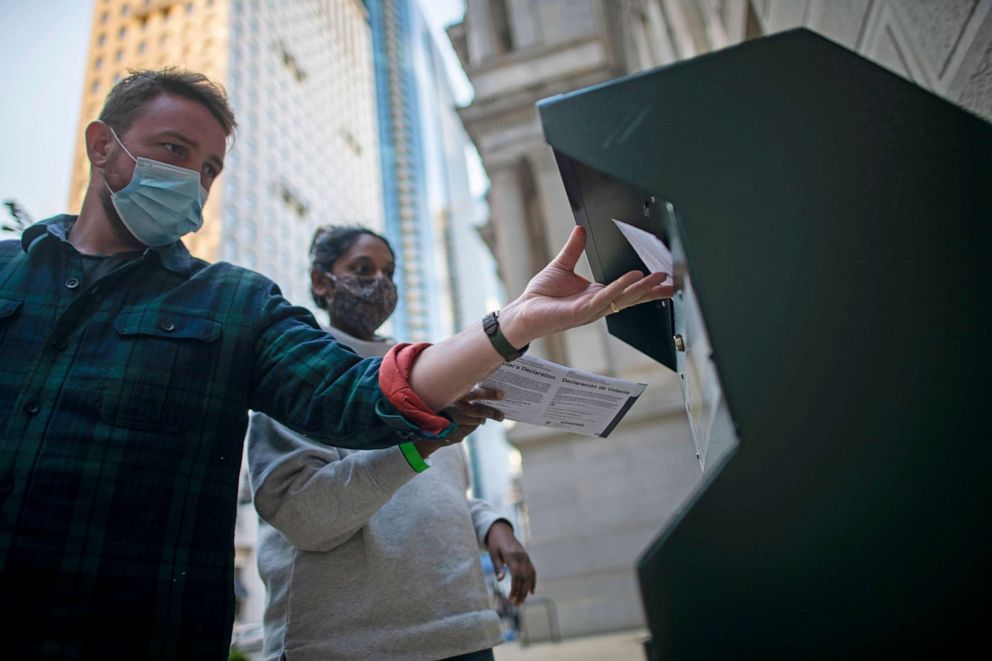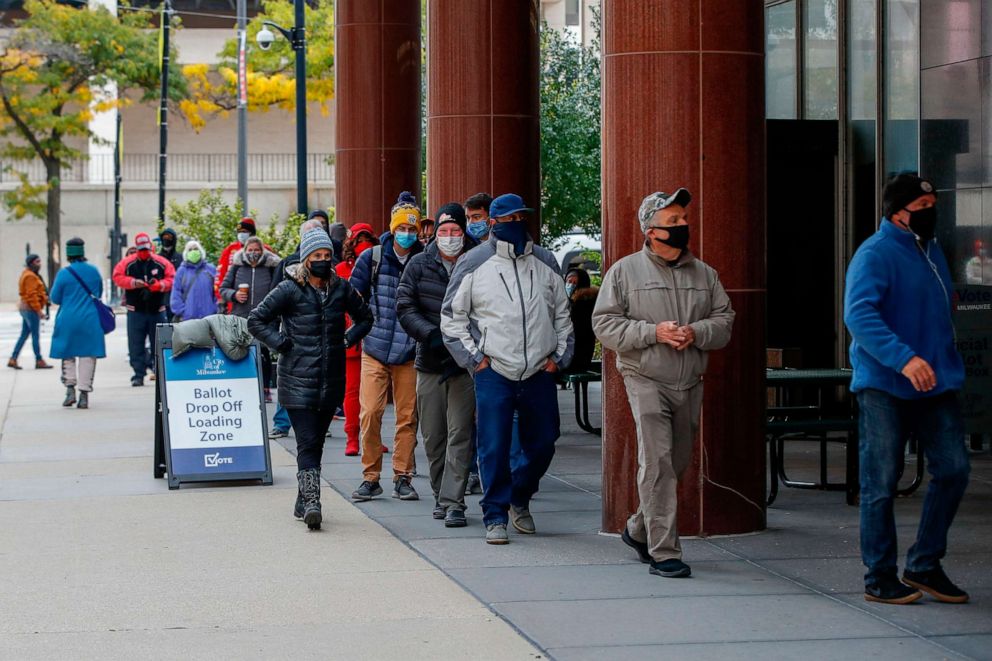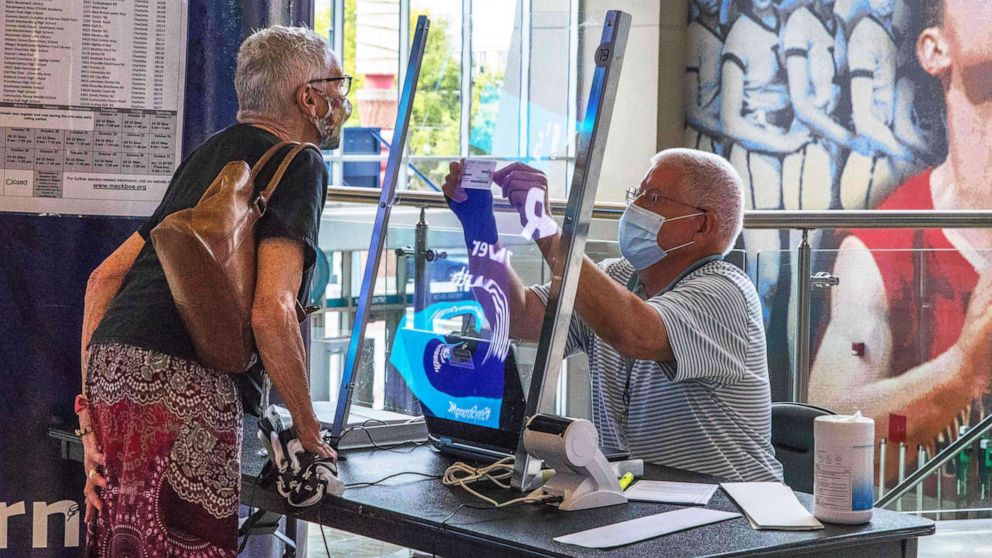The Supreme Court’s rulings on election deadlines may actually be 'calm before the storm'
When the Supreme Court decided this week that Pennsylvania can go ahead with plans to count ballots postmarked by Election Day -- even if they arrive as much as three days late in the mail – Democrats hailed the move as a sign that the high court was, finally, establishing clear rules for Nov. 3.
But experts said the situation in Pennsylvania was far from settled. The high court was actually silent on the issue of extending ballot deadlines, instead allowing the state supreme court decision on the issue to stand. The split decision still left open the potential for a new, ninth justice to tip the ruling one way or the other.
“A lot of the initial response was that this was a big win for Democrats, but it is much less clear than that,” said Kate Shaw, a Cardozo law professor and legal consultant for ABC News. “The bottom line is, this is way less decisive then it may appear.”
The Supreme Court is likely not finished sorting out a question that could be crucial to the outcome a close election next month – whether ballots mailed before Nov. 3, but arriving after, should be counted. And in Pennsylvania, officials are already warning voters not to misread the ruling as permission to wait longer to mail their ballots. On Wednesday, Pennsylvania Secretary of State Kathy Boockvar urged voters “if possible” to try and vote in person.
A court decision on a similar case from Wisconsin is imminent, and there are a half-dozen others recently decided or still pending in battleground states that may ultimately decide when election boards must stop accepting votes-- and the fate of a key number of votes that could decide a close election. Though Election Day is set by federal law, states make their own rules governing voting and how the ballots are counted.
The campaigns and various interest groups have brought cases in North Carolina, Michigan, Minnesota, Georgia and Alabama, all exploring the question that, ultimately, the high court may not answer until after Election Day.
With an unprecedented level of absentee voting expected as voters try to stay safe during the pandemic, pressure from Republicans to end the contest on Election Day, and 19 states allowing ballots to be counted after Nov. 3, any ruling from the high court could be crucial.
And some experts say that the legal battle over the election could explode if the count is close in battleground states after Nov. 3.
“There is still very much a chance that there is a renewed challenge at the counting stage,” Shaw said. “So don’t rely on the counting of any ballot that comes after Election Day. There will be litigation after the election about the counting of ballots – especially the ones that arrive late.”
'You can't understate it'
If the contest between President Donald Trump and Democrat Joe Biden is close in enough battleground states, legal experts said any one of the decisions being made by the U.S. Supreme Court in the next two weeks could have an impact on the outcome of the election due to the unprecedented scope of mail voting.
"More people are going to be voting by mail and more organizations are going to be pushing vote-by-mail," said Myrna Perez, a lawyer at New York University's nonpartisan Brennan Center. "You can’t understate it."
More than 80 million absentee ballots have been requested -- double the number in 2016.
During the recent primary elections, 500,000 mail-in-ballots submitted by voters were rejected, and a third of those were tossed out because they arrived late, according to an ABC News analysis. That outcome – combined with the new pressures the coronavirus pandemic is placing on mail-in voting – has set up a legal tug-of-war for the general election.
Democrats are pushing to give voters more time – allowing ballots post-marked by Election Day to be accepted, even if they arrive late. In many cases, a late ballot isn't the voter's fault. "Every voter that is mailing in a ballot it is hoping it will get there on time," Perez said. "It’s one of these things where voters are doing their best. Times are really tough right now."
Republicans are calling for the election to end on Election Day, period. “Congress has the power to set the time of the election and it has done that – a single nationwide election day,” said Jason Snead, executive director of the Honest Elections Project, a legal group arguing on behalf of Republicans in several of the cases. “A state cannot change that. It can’t extend that process.”
Trump has cast doubt on the legitimacy of ballots that arrive after election day and on any results that are not immediately available on election night. During an interview on Fox News this week, he called the Supreme Court's ruling "crazy," "ridiculous," and "very strange" while expressing dismay that it may lead to a delay in results.

Lower courts have offered a series of mixed views on the question of the election deadline – especially during a pandemic. Late Tuesday, the Court of Appeals in North Carolina ruled 12-3 that votes postmarked by 5 p.m. on Election Day could be accepted up to Nov. 12. In Michigan, though, the Court of Appeals rejected a two-week grace period that Michigan officials had created for voters.
That ruling came as nearly 1.4 million voters in the key swing state had already returned their ballots as of Friday. Michigan Secretary of State Jocelyn Benson on Tuesday urged residents not to wait any longer to use the mail system to return their ballots. She urged voters to try to hand deliver them.
Some 6,400 ballots were rejected for lateness in the Michigan primary this August, according to data from Benson's office. Trump carried the state by just over 10,000 votes in 2016.
In Wisconsin, Democrats have asked the Supreme Court to allow a six-day extension that was granted by a lower court judge, only to be blocked by an appeals court last week. In a fiery dissent, 7th Circuit Court of Appeals Judge Ilana Rovner called the court's decision to overturn the lower court's ruling a "travesty."
The decision "leaves voters at the mercy of overworked state and local election officials, a hamstrung Postal Service, and a merciless virus," she wrote. "Good luck and G-d bless, Wisconsin. You are going to need it."
The decision from the Supreme Court on the Wisconsin case should come down any day. If the court deadlocks again, as they did in the Pennsylvania case this week-- it would have the opposite practical effect for voters there: the lower court's ruling prohibiting any extension would remain in place.
'A little hard to read' Pennsylvania decision
Cases on this question have been brewing in the courts for much of 2020, as it became increasingly clear that more voters would need to rely on the mail because of fears of voting in person during a pandemic.
In April, a dispute over deadlines in the Wisconsin primary wound all the way to the Supreme Court. The conservative majority ruled with Republicans in requiring that all mail-in ballots carry a postmark from on or before election day.
The Pennsylvania decision in the U.S. Supreme Court offered little insight into where the court may ultimately go next, said Paul M. Smith, the vice president for litigation and strategy for the Campaign Legal Center, a nonpartisan organization that works on voting rights issues.
"It's a little hard to read what happened because the court didn't say anything about it," he said during a briefing on Monday.

The fact that the decision was 4-4, with Chief Justice John Roberts siding with the more liberal wing of the court, also means that the direction of the court could shift if Judge Amy Coney Barrett is confirmed as the ninth justice, said Wendy Weiser, an expert from the Brennan Center.
Weiser told ABC News that when the court received the Pennsylvania case, it had already ruled on seven recent voting rights cases on an array of issues, and five went against those seeking expanded opportunities for voters.
“Had Judge Barrett been sitting on the Court, she would have cast the deciding vote,” Weiser said. “In other words, her nomination could prove very consequential to election-related litigation this year, if she is confirmed and chooses not to recuse herself from voting cases.”
Weiser said the Supreme Court could have widespread implications for future elections, since under current rules 19 states count absentee ballots received after Election Day and accept votes from citizens who are permitted to vote after midnight if they have been waiting in long lines.
“It could also have ripple effects in many other areas of law where deadlines are counted by the mailing date,” Weiser said of any election related decisions out of the Supreme Court.
For the lawyers engaged in the flurry of legal activity as the election draws near, this has been a chaotic period. But Snead, the director of the Honest Elections Project, said the current phase may actually be the “calm before the storm.”
If the election is close in any number of crucial battleground states, Snead and other lawyers involved in the voting rights cases said, the outcome could fast become entangled in legal fights over which ballots count, and which should be discarded.
“A lot of battleground states could erupt after Election Day,” Snead said.
ABC News' Cheyenne Haslett and Devin Dwyer contributed to this report.




